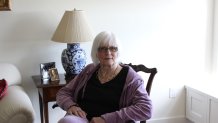
A life and death debate over rights and ethics took over the virtual Capitol on Friday. Lawmakers heard public testimony on the aid-in-dying bill being considered for at least the eighth legislative session.
“Today is the day, it’s been exactly 28 months since she’s passed and I still count every minute that we’ve been apart,” Gregory Shimer of West Hartford started his testimony.
Shimer told lawmakers that his wife Tracy lived 12 years after she was diagnosed with a brain tumor, but would have opted to choose when she took her last breath.
“When you’re dying your choices are gone,” said Shimer, who also watched his mother die of lung cancer in 2015. “I think if you have the choice to say you want it or at least feel like you have it that gives you the dignity back.”
Get Connecticut local news, weather forecasts and entertainment stories to your inbox. Sign up for NBC Connecticut newsletters.
Jason Smith of Greenwich said his aunt took her own life when the pain of her illness became unbearable.

“She suffered the most ungracious, undignified and horrible death imaginable,” said Smith who heads the Completed Life Initiative.
Local
Shimer and Smith were one of more than 125 people who spoke to lawmakers Friday about the aid-in-dying bill.
“If my aunt had been able to die with dignity, she would have been able to complete her life when she still enjoyed it,” added Smith.
The bill would allow a person who’s been diagnosed with less than six months to live the ability to legally ask a doctor for medicine to end their life. The person must make the request of two physicians three times, receive counseling and have two witnesses attest that the request is voluntary. Despite these parameters, some say it’s a slippery slope.
“Once you open this up, you're closing other doors. You're reducing the incentive for research to do better palliative care, better pain management, more home care, more support to that people can live in high levels of disability or terminal illness,” said Cathy Ludlum of Manchester.
The Connecticut Catholic Conference also expressed concern saying in a statement, “People may have their lives taken without their consent.”
If passed, the law would take effect on Oct. 1. However, the bill has been considered by lawmakers eight times and has yet to make it out of committee.
“To have the choice and the preparation, and the timing around their goodbyes, that would be extraordinary,” said Rep. Anne Hughes, a Democrat from Easton.
Senator Heather Somers asked each physician who spoke, “ How can you as a clinician and a doctor take an oath advocate for both life and death?”
“To me, it’s a problem that can’t be solved. I just don’t see how physicians can be healers and killers at the same time,” answered Dr. Joseph Marine, Johns Hopkins School of Medicine.
The aid-in-dying bill brought out impassioned pleas from people on both sides of the debate.
“Now we’re saying that there is a point though where your life, your pain outweighs the value of your life,” said Sherman Gillums, who serves the National Action Alliance for Suicide Prevention.
A total of 450 pieces of written testimony were submitted.
“It’s not that they want to die. It’s that they want to stop the pain,” explained Rep. Terri Wood, a Republican from Darien who said she’s lost friends to suicide.
Backers of the bill said safeguards such as requiring the approval of two doctors, witnesses and counselors will ensure that the person making the request is not doing so for someone else’s financial advantage or malicious intent.
One of those safeguards is that the person must take the deliberate act of ingesting the medication themselves.
“That helps to ensure that the decision is with the dying person from start to finish,” explained Kim Callinan, the CEO of Compassion and Choices.
Avon Attorney Christopher Rossetti spoke about the rare form of eye cancer he has which doctors said will eventually lead to liver failure.
“It would be of great comfort to know I might have some control over the last days of my life,” Rossetti told lawmakers.
Jennifer Mizzone, whose husband died of ALS in 2019, said they thought of moving to one of the nine states that have similar laws so that her husband could die with dignity.
“We were already so overwhelmed with the disease itself,” said the Orange woman. “You take the focus away from the illness itself and living the best life.”
Barbara Wilkov’s mother died of ovarian cancer at the age of 97. Before her death in 2019, she dictated a letter that her daughter read to lawmakers.
“I’m leaving this world in a torturous and miserable way that I would not wish on any caring human being,” read the Stamford woman.
The hearing started at nine o'clock in the morning and as of six in the evening, was still taking place.



